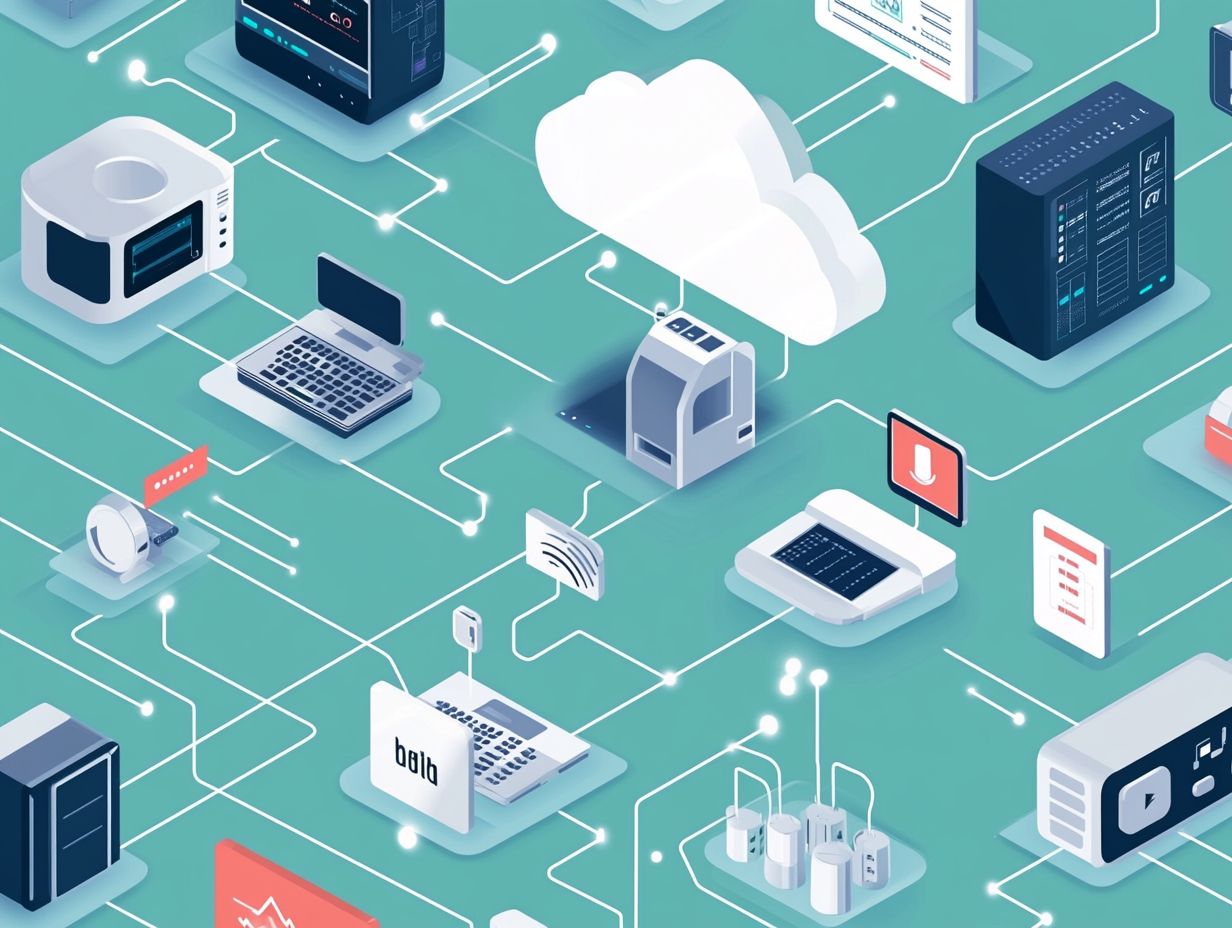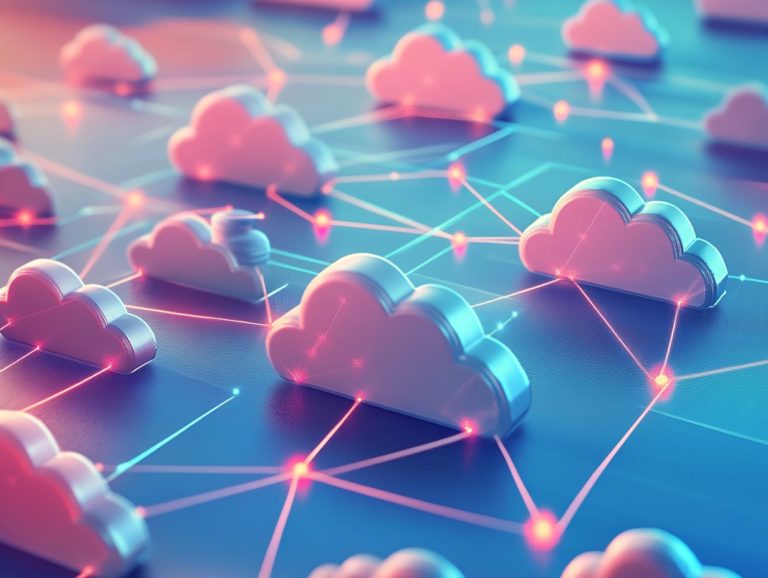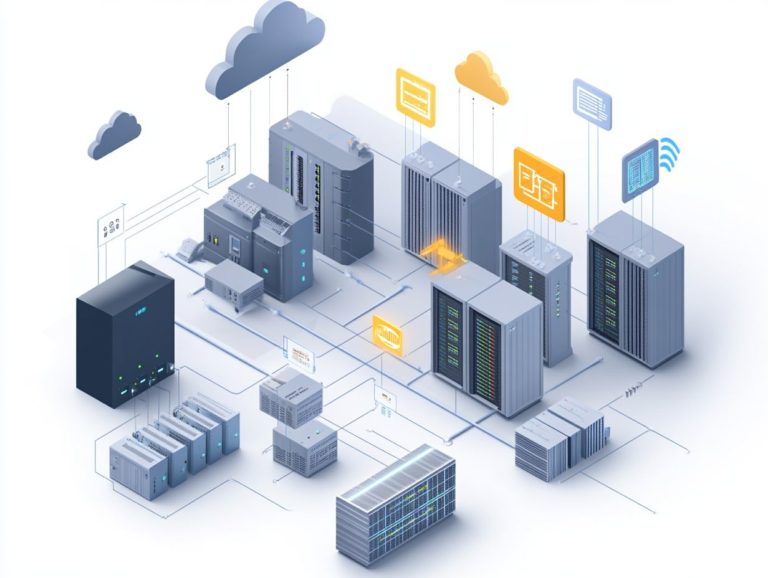Integrating IoT with Hybrid Cloud Solutions
The fusion of the Internet of Things (IoT) and hybrid cloud solutions is revolutionizing how you operate and innovate your business.
As your devices become more interconnected, harnessing cloud capabilities provides you with unparalleled scalability, flexibility, and valuable data insights. However, this integration does come with its own set of challenges, especially in terms of security and data management.
This article delves into the essentials of IoT and hybrid cloud, highlighting their advantages, real-world applications, and the future of these transformative technologies. Unlock the potential of this synergy to elevate your operations and drive explosive growth!
Contents
- Key Takeaways:
- The Basics of IoT and Hybrid Cloud
- Benefits of Integrating IoT with Hybrid Cloud
- Challenges and Solutions for Integration
- Real-World Examples of IoT and Hybrid Cloud Integration
- Future Outlook for IoT and Hybrid Cloud Integration
- Frequently Asked Questions
- What is the definition of IoT and why is it important to integrate with hybrid cloud solutions?
- How does integrating IoT with hybrid cloud solutions benefit businesses?
- What are some use cases for integrating IoT with hybrid cloud solutions?
- What challenges should be considered when integrating IoT with hybrid cloud solutions?
- Can you provide an overview of the process for integrating IoT with hybrid cloud solutions?
- 6. What are some best practices for successfully integrating IoT with hybrid cloud solutions?
Key Takeaways:
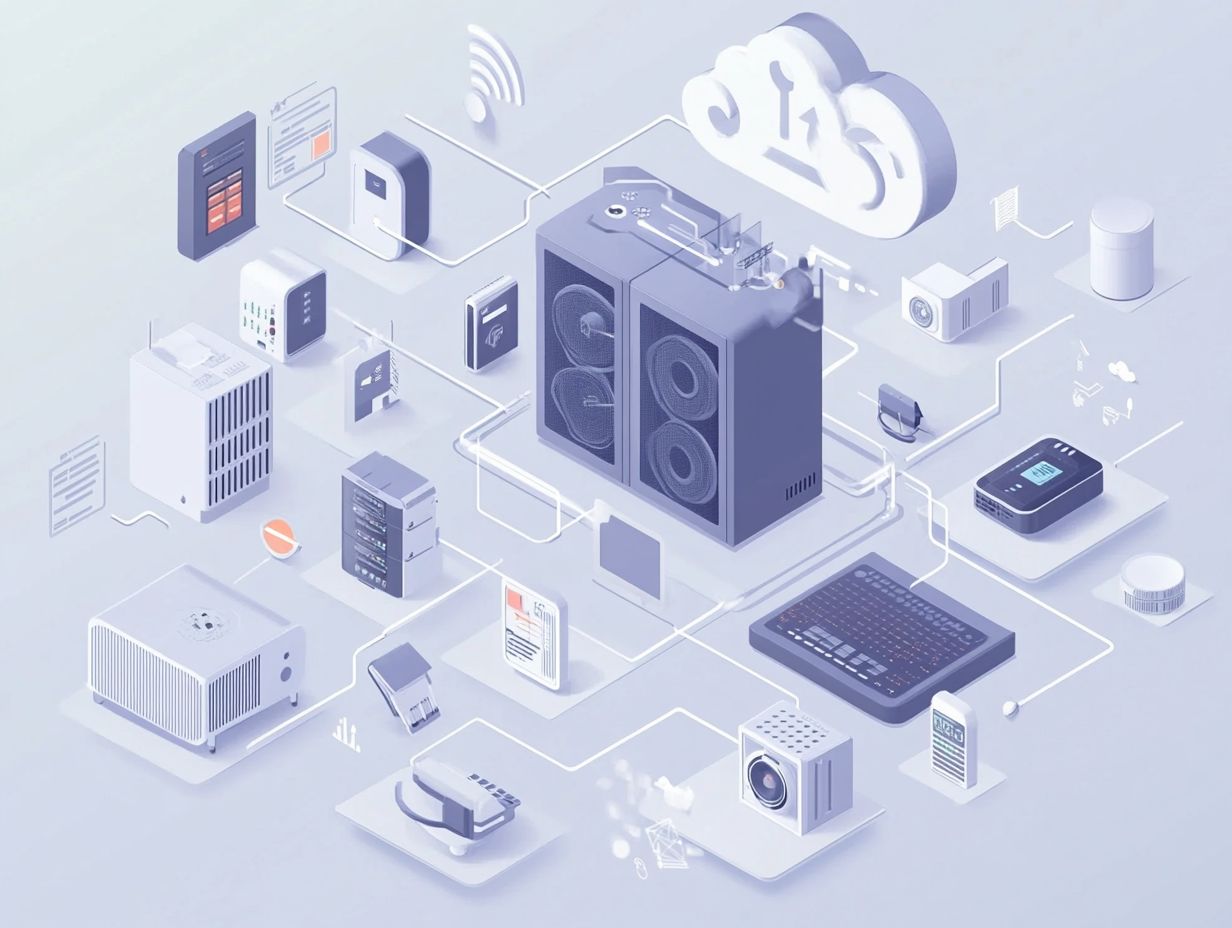
- Integrating IoT with Hybrid Cloud offers improved scalability and flexibility.
- Organizations can gain enhanced data analysis capabilities for informed decisions.
- Security concerns must be addressed for effective integration.
The Basics of IoT and Hybrid Cloud
The convergence of IoT and Hybrid Cloud marks a transformative era for you, where the Internet of Things (IoT) is revolutionizing connectivity in smart cities and industries.
Hybrid cloud solutions offer the robust infrastructure needed for effective data management and storage. By integrating connected devices, you can harness real-time data to elevate operational efficiency and refine decision-making processes across diverse sectors, including healthcare and manufacturing.
Defining IoT and Hybrid Cloud
IoT, or the Internet of Things, represents an intricate web of devices that gather and share data. A Hybrid Cloud is a sophisticated cloud computing environment that seamlessly blends public and private cloud solutions, offering you enhanced flexibility and scalability.
In essence, IoT gives the power to smart interactions among devices, allowing them to automate tasks and optimize processes through real-time data sharing. This interconnectedness is vital, as it enables you to harness actionable insights from the vast amounts of data collected.
Simultaneously, the Hybrid Cloud serves as an ideal framework for efficiently managing this data, providing secure storage and allowing your business to utilize AI-driven tools for more well-considered choices.
With the integration of edge computing processing data close to where it is generated instead of sending it to a distant server getting quicker response times further enhances both operational efficiency and security.
Benefits of Integrating IoT with Hybrid Cloud
Integrating IoT with Hybrid Cloud solutions offers you a wealth of benefits. You’ll experience enhanced scalability and flexibility that aligns with the diverse needs of smart cities and enterprises, especially when it comes to integrating on-premise with hybrid cloud.
This approach not only optimizes performance but also enhances cost-effectiveness, driving overall business efficiency to new heights.
Improved Scalability and Flexibility
One of the most significant advantages of integrating IoT with Hybrid Cloud is the enhanced scalability and flexibility it offers, allowing you to adjust your resources in response to fluctuating demands.
This capability is crucial as you navigate varying loads, especially in industries like manufacturing, healthcare, and smart cities, where real-time data processing is essential.
By leveraging a type of cloud service that lets you rent computing power and storage from leading cloud vendors, you can dynamically allocate computing power and storage, ensuring that your IoT applications perform optimally, no matter the circumstances.
For instance, consider a smart agriculture company you can easily ramp up your cloud resources during harvest season when data influx peaks, just as a healthcare provider might scale their infrastructure to accommodate surge demands during health crises.
This flexibility boosts your operational efficiency and sparks exciting innovations, giving you the power to stay competitive in a rapidly evolving market.
Enhanced Data Analysis and Insights
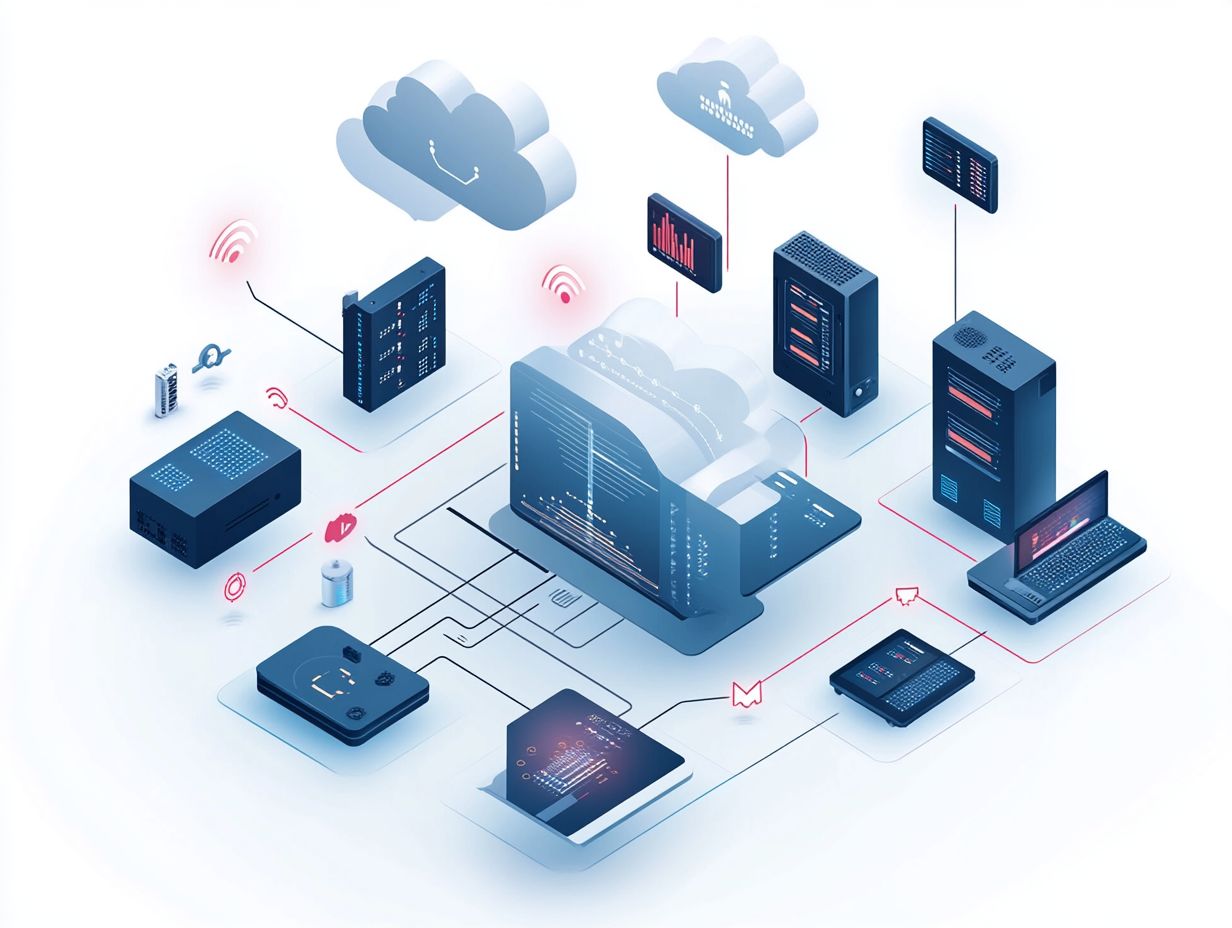
Integrating IoT and Hybrid Cloud enhances your data analysis capabilities. It gives you the power to extract valuable insights from the vast amounts of big data generated by connected devices in real time, especially at the intersection of IaaS and IoT.
This transformative approach allows you to leverage machine learning, a type of technology that allows computers to learn from data and make predictions, along with AI-driven tools that effectively interpret complex datasets with ease.
In smart cities, for example, you can analyze real-time traffic data to optimize flow and reduce congestion. In manufacturing, using data to predict future outcomes helps you minimize downtime and maximize productivity.
In the healthcare sector, these technologies enable swift patient monitoring and diagnosis by analyzing real-time health data. Such applications highlight how utilizing the strength of data drives operational efficiencies and elevates the quality of life for citizens and stakeholders alike.
Challenges and Solutions for Integration
The integration of IoT with Hybrid Cloud offers a wealth of benefits, but it also introduces certain challenges. Understanding the role of AI in hybrid cloud solutions can help address security concerns and data storage management, which are critical issues that you must navigate with precision and care to harness the full potential of this powerful combination.
Addressing Security Concerns
Security concerns pose a significant challenge when integrating IoT and Hybrid Cloud. It’s essential to implement stringent data privacy measures and robust encryption protocols to protect sensitive information from unauthorized access.
To effectively mitigate these risks, adopt comprehensive security strategies that incorporate advanced encryption methods like AES and RSA. This ensures that your data remains unreadable to anyone without proper authorization.
Implementing cloud security measures such as multi-factor authentication and role-based access controls can greatly enhance sensitive data protection. This approach secures user authentication and emphasizes the need to grant access exclusively to authorized personnel.
By prioritizing these strategies, you can maintain data integrity and build greater trust with your users, ultimately creating a more secure IoT environment.
Managing Data Storage and Processing
Effective management of data storage and processing is essential as you leverage IoT and Hybrid Cloud technologies, especially given the ever-increasing volume of data generated by connected devices.
You must quickly explore various storage solutions. Consider online storage for its flexibility and scalability, and edge computing, which brings data processing closer to where it s generated. This approach is key to using your resources wisely and speeding up response times!
Implementing a robust disaster recovery strategy is vital to ensure that your data remains accessible and reliable, safeguarding against potential incidents that could disrupt your operations.
These strategies not only protect you from data loss but also help maintain business continuity, allowing you to thrive in a rapidly evolving digital landscape.
Real-World Examples of IoT and Hybrid Cloud Integration
Real-world examples of IoT and Hybrid Cloud integration highlight the tangible benefits and applications across diverse sectors. They showcase innovative solutions in areas such as smart cities, virtual power plants, and logistics.
These examples offer a glimpse into how these technologies can transform everyday operations and enhance efficiency.
Embracing these technologies today is crucial to staying competitive and innovative in tomorrow’s landscape.
Case Studies of Successful Implementations
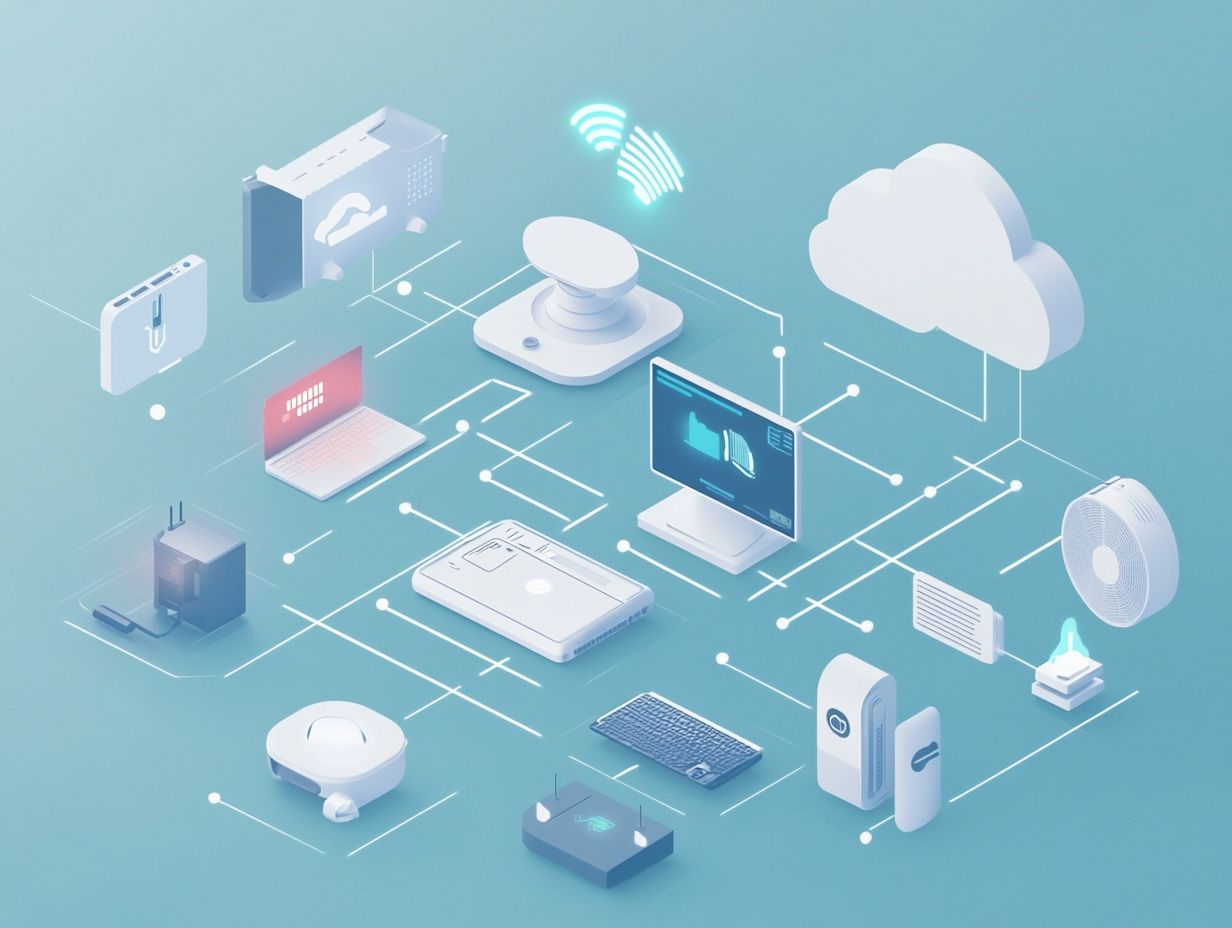
Numerous case studies highlight the successful integration of IoT and Hybrid Cloud technologies across various sectors, including healthcare and smart cities. These examples showcase significant enhancements in how well things work and the user experience.
For instance, a leading healthcare provider integrated IoT devices with a hybrid cloud platform to monitor patient vitals in real time. By leveraging AI analytics, they could predict potential complications, streamlining patient care and reducing hospital stays by an impressive 20%.
In another case, a city implemented smart sensors linked to a hybrid infrastructure for traffic management, achieving a notable 15% reduction in congestion. Such initiatives illustrate the transformative potential of these technologies and reveal measurable benefits, including lower costs, optimized resource allocation, and improved service quality.
Future Outlook for IoT and Hybrid Cloud Integration
The future outlook for IoT and Hybrid Cloud integration appears exceptionally promising. Predictions indicate significant growth opportunities in areas like automation, smart cities, and refined connectivity management.
Now’s the time to embrace these advancements to position yourself at the forefront of innovation and efficiency.
Predictions and Potential Growth Areas
Predictions regarding the integration of IoT with Hybrid Cloud indicate a significant surge in areas such as AI-driven tools and machine learning, which will enhance your data-driven decision-making processes.
As you embrace these technologies, expect to see transformative impacts across various sectors, including healthcare, finance, and manufacturing.
In healthcare, for example, AI can streamline patient diagnostics and create personalized treatment plans. In finance, machine learning algorithms enhance fraud detection and risk assessment.
By leveraging interconnected devices and robust data analytics, you can optimize operations, enrich customer experiences, and foster innovation.
Embracing these advancements will be essential for staying competitive in an ever-evolving digital landscape.
Frequently Asked Questions
-
What is the definition of IoT and why is it important to integrate with hybrid cloud solutions?
IoT, or Internet of Things, refers to the network of physical devices such as sensors, appliances, and vehicles that are connected and can collect and exchange data. Integrating IoT with hybrid cloud solutions allows for efficient storage, analysis, and management of this data, making it easier to harness its potential.
-
How does integrating IoT with hybrid cloud solutions benefit businesses?
Integrating IoT with hybrid cloud solutions provides businesses with greater agility, scalability, and flexibility in managing and analyzing large amounts of data. It also enables real-time processing and decision-making, leading to improved operational efficiency and cost savings.
-
What are some use cases for integrating IoT with hybrid cloud solutions?
Examples of integrating IoT with hybrid cloud solutions include supply chain management, predictive maintenance, remote monitoring and control, and enhancing customer experience through personalized services and targeted marketing.
-
What challenges should be considered when integrating IoT with hybrid cloud solutions?
Challenges to be aware of when integrating IoT with hybrid cloud solutions include data security and privacy concerns, compatibility issues between different systems and devices, and the need for effective management and analysis of large data volumes.
-
Can you provide an overview of the process for integrating IoT with hybrid cloud solutions?
The process typically involves identifying business needs and objectives, selecting the appropriate cloud and IoT platforms, connecting devices and sensors, managing and analyzing data, and continuously monitoring and optimizing the system.
For more information on how you can leverage IoT and Hybrid Cloud solutions, contact us today and join the innovation wave!
6. What are some best practices for successfully integrating IoT with hybrid cloud solutions?
To successfully integrate IoT with hybrid cloud solutions, start with thorough research and careful planning. Data security and compliance are crucial, so ensure these aspects are addressed early on.
Select reliable and compatible platforms to avoid technical issues down the line. Regularly monitor and optimize your system to maintain efficient performance.

